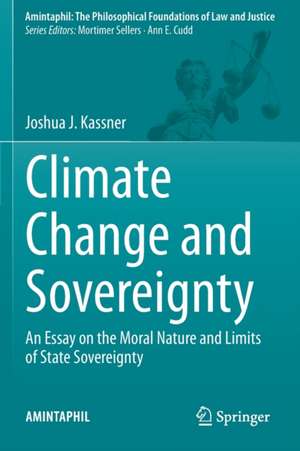Climate Change and Sovereignty: An Essay on the Moral Nature and Limits of State Sovereignty: AMINTAPHIL: The Philosophical Foundations of Law and Justice, cartea 10
Autor Joshua J. Kassneren Limba Engleză Paperback – 7 mai 2022
The discussion moves from theory to practice. Coverage starts with a conceptual analysis and moral critique. It then goes on to consider specific issues. These include global climate change, secession and self-determination, human rights, global distributive justice, and immigration. Readers will learn how states ought to deliberate about and respond to these important topics. They will also discover potential institutional structures better suited to resolving these issues while also respecting state sovereignty.
In working through each specific challenge, the author provides insight into how we ought to think about challenges facing the international community and the potential for properly constructed institutions to function as solutions. These analyses also provide a valuable critical lens to assess the actions (and omissions) of our leaders. In the end, the book argues that domestic governments and regional bodies should be responsible for implementing the chosen course of action. This would provide a basis for holding political leaders more accountable.
| Toate formatele și edițiile | Preț | Express |
|---|---|---|
| Paperback (1) | 885.95 lei 6-8 săpt. | |
| Springer International Publishing – 7 mai 2022 | 885.95 lei 6-8 săpt. | |
| Hardback (1) | 891.80 lei 6-8 săpt. | |
| Springer International Publishing – 6 mai 2021 | 891.80 lei 6-8 săpt. |
Preț: 885.95 lei
Preț vechi: 1080.43 lei
-18% Nou
Puncte Express: 1329
Preț estimativ în valută:
169.52€ • 177.47$ • 140.27£
169.52€ • 177.47$ • 140.27£
Carte tipărită la comandă
Livrare economică 05-19 aprilie
Preluare comenzi: 021 569.72.76
Specificații
ISBN-13: 9783030735807
ISBN-10: 303073580X
Ilustrații: XII, 195 p. 1 illus.
Dimensiuni: 155 x 235 mm
Greutate: 0.3 kg
Ediția:1st ed. 2021
Editura: Springer International Publishing
Colecția Springer
Seria AMINTAPHIL: The Philosophical Foundations of Law and Justice
Locul publicării:Cham, Switzerland
ISBN-10: 303073580X
Ilustrații: XII, 195 p. 1 illus.
Dimensiuni: 155 x 235 mm
Greutate: 0.3 kg
Ediția:1st ed. 2021
Editura: Springer International Publishing
Colecția Springer
Seria AMINTAPHIL: The Philosophical Foundations of Law and Justice
Locul publicării:Cham, Switzerland
Cuprins
Introduction and Overview.- Part I Developing a Framework for Assessing the Moral Limits of State Sovereignty and Sovereign Discretion.- Explicating the Tension between State Sovereignty and the New Challenges Facing the International Community.- Assessing the Limitations Inherent to the Notion of Sovereignty Itself.- Assessing the Limitations from the Best Available Justification for Sovereignty.- Introducing a Framework for Assessing the Moral Limits of Sovereignty and Sovereign Discretion.- Part II Making the Transition from Theory to Practice.- Understanding the Application of the Framework.- Global Climate Change: A Matter of Transnational Ethical Concern.- Applying the Framework: Limits to Sovereign Discretion Inherent to Sovereignty.- Applying the Framework: Limits Implied by Instrumental Value of Sovereignty.- Explicating Institutional Legitimacy.- Conclusion: Some Suggestions for Institutional Design and Reform.
Notă biografică
Joshua J. Kassner is an Associate Professor of Philosophy at the University of Baltimore, where he teaches ethics, jurisprudence and political philosophy. He was also a Freeman Resident Ethics Fellow at the Vice Admiral James B. Stockdale Center for Ethical Leadership at the United States Naval Academy during AY 2018-19. His work focuses on global justice and international political and legal theory, subjecting the norms, practices and principles that govern the normative framework of international relations to rigorous philosophical scrutiny. He has published or presented on global justice, human rights, humanitarian intervention and the moral nature of borders.
Textul de pe ultima copertă
This book offers a meditation on global justice and international political and legal theory. The author assesses positions in the current debate over the moral nature and limits of sovereignty. He also evaluates the normative role sovereignty ought to play in the practical deliberations of states.
The discussion moves from theory to practice. Coverage starts with a conceptual analysis and moral critique. It then goes on to consider specific issues. These include global climate change, secession and self-determination, human rights, global distributive justice, and immigration. Readers will learn how states ought to deliberate about and respond to these important topics. They will also discover potential institutional structures better suited to resolving these issues while also respecting state sovereignty.
In working through each specific challenge, the author provides insight into how we ought to think about challenges facing the international community and the potential for properly constructed institutions to function as solutions. These analyses also provide a valuable critical lens to assess the actions (and omissions) of our leaders. In the end, the book argues that domestic governments and regional bodies should be responsible for implementing the chosen course of action. This would provide a basis for holding political leaders more accountable.
The discussion moves from theory to practice. Coverage starts with a conceptual analysis and moral critique. It then goes on to consider specific issues. These include global climate change, secession and self-determination, human rights, global distributive justice, and immigration. Readers will learn how states ought to deliberate about and respond to these important topics. They will also discover potential institutional structures better suited to resolving these issues while also respecting state sovereignty.
In working through each specific challenge, the author provides insight into how we ought to think about challenges facing the international community and the potential for properly constructed institutions to function as solutions. These analyses also provide a valuable critical lens to assess the actions (and omissions) of our leaders. In the end, the book argues that domestic governments and regional bodies should be responsible for implementing the chosen course of action. This would provide a basis for holding political leaders more accountable.
Caracteristici
Offers a thoughtful meditation on global justice and international political and legal theory Addresses such issues as climate change, human rights, and immigration Argues that domestic governments and regional bodies should be responsible for resolving issues











